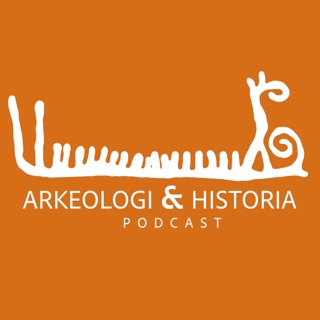
AMA | December 2023
Welcome to the December 2023 Ask Me Anything episode of Mindscape! These monthly excursions are funded by Patreon supporters (who are also the ones asking the questions). We take questions asked by Patreons, whittle them down to a more manageable number -- based primarily on whether I have anything interesting to say about them, not whether the questions themselves are good -- and sometimes group them together if they are about a similar topic. Enjoy!Blog post with questions and transcript: https://www.preposterousuniverse.com/podcast/2023/12/04/ama-december-2023/Link to the article referenced about time travel in movies: Ars Technica.There will be no AMA in January due to holiday break.Mindscape Big Picture Scholarship.Support Mindscape on Patreon.See Privacy Policy at https://art19.com/privacy and California Privacy Notice at https://art19.com/privacy#do-not-sell-my-info.
4 Dec 20233h 36min

258 | Solo: AI Thinks Different
The Artificial Intelligence landscape is changing with remarkable speed these days, and the capability of Large Language Models in particular has led to speculation (and hope, and fear) that we could be on the verge of achieving Artificial General Intelligence. I don't think so. Or at least, while what is being achieved is legitimately impressive, it's not anything like the kind of thinking that is done by human beings. LLMs do not model the world in the same way we do, nor are they driven by the same kinds of feelings and motivations. It is therefore extremely misleading to throw around words like "intelligence" and "values" without thinking carefully about what is meant in this new context.Blog post with transcript: https://www.preposterousuniverse.com/podcast/2023/11/27/258-solo-ai-thinks-different/Support Mindscape on Patreon.Some relevant references:Introduction to LLMs by Andrej Karpathy (video)OpenAI's GPTMelanie Mitchell: Can Large Language Models Reason?Mitchell et al.: Comparing Humans, GPT-4, and GPT-4V On Abstraction and Reasoning TasksKim et al.: FANToM: A Benchmark for Stress-testing Machine Theory of Mind in InteractionsButlin et al.: Consciousness in Artificial Intelligence: Insights from the Science of ConsciousnessMargaret Boden: AI doesn't have feelingsSee Privacy Policy at https://art19.com/privacy and California Privacy Notice at https://art19.com/privacy#do-not-sell-my-info.
27 Nov 20231h 20min

257 | Derek Guy on the Theory and Practice of Dressing Well
Putting on clothes is one of the most universal human experiences. Inevitably, this involves choices; maybe you just grab the cheapest and most convenient clothing available, or maybe you want to fit seamlessly into your local environment, whatever that might be. But maybe you choose to dress more consciously, putting a bit of effort into crafting a personal style and creating a desired impression in others. Derek Guy has, to his own surprise, become well-known as the menswear guy on Twitter. He has put a lot of thought into both the practicalities of clothing (how to find a suit that fits) and its wider social impact (how fashion acts as a cultural language). We talk about both sides of the coin.(Picture on right is not Derek, but rather former US Attorney General Elliot Richardson, whose dapper image Derek uses as his avatar.)Blog post with transcript: https://www.preposterousuniverse.com/podcast/2023/11/20/257-derek-guy-on-the-theory-and-practice-of-dressing-well/Support Mindscape on Patreon.Derek Guy is a fashion writer living in San Francisco. He blogs at Die, Workwear!, and contributes to a number of publications.Twitter (X)WikipediaPolitico essay on John FettermanSee Privacy Policy at https://art19.com/privacy and California Privacy Notice at https://art19.com/privacy#do-not-sell-my-info.
20 Nov 20231h 20min

256 | Kelly and Zach Weinersmith on Building Cities on the Moon and Mars
There is an undeniable romance in the idea of traveling to, and even living in, outer space. In recent years, a pragmatic justification has become increasingly popular: the Earth is vulnerable to threats both natural and human-made, and it seems only prudent to spread life to other locations in case a disaster befalls our home planet. But how realistic is such a grand ambition? The wife-and-husband team of Kelly and Zack Weinersmith have tackled this question from a dizzying number of angles, from aeronautics and biology to law and psychology. The result is their new book, A City on Mars: Can We Settle Space, Should We Settle Space, and Have We Really Thought This Through? It provides an exceptionally clear-eyed view of the challenges and opportunities ahead.Blog post with transcript: https://www.preposterousuniverse.com/podcast/2023/11/13/256-kelly-and-zach-weinersmith-on-building-cities-on-the-moon-and-mars/Support Mindscape on Patreon.Kelly Weinersmith received a Ph.D. in ecology from the University of California, Davis. She is currently an adjunct professor in the department of biosciences at Rice University. Zack Weinersmith received a B.S. in English from Pfizer College. He is the creator of the popular webcomic Saturday Morning Breakfast Cereal, as well as the author and co-author of several books, including Bea Wolf, a retelling of Beowulf as a children's story, with illustrations by Boulet. Kelly and Zach are also co-authors of Soonish: Ten Emerging Technologies That'll Improve and/or Ruin Everything.See Privacy Policy at https://art19.com/privacy and California Privacy Notice at https://art19.com/privacy#do-not-sell-my-info.
13 Nov 20231h 24min

AMA | November 2023
Welcome to the November 2023 Ask Me Anything episode of Mindscape! These monthly excursions are funded by Patreon supporters (who are also the ones asking the questions). We take questions asked by Patreons, whittle them down to a more manageable number -- based primarily on whether I have anything interesting to say about them, not whether the questions themselves are good -- and sometimes group them together if they are about a similar topic. Enjoy!Blog post with questions and transcript: https://www.preposterousuniverse.com/podcast/2023/11/06/ama-november-2023/See Privacy Policy at https://art19.com/privacy and California Privacy Notice at https://art19.com/privacy#do-not-sell-my-info.
6 Nov 20234h 20min

255 | Michael Muthukrishna on Developing a Theory of Everyone
A "Theory of Everything" is physicists' somewhat tongue-in-cheek phrase for a hypothetical model of all the fundamental physical interactions. Of course, even if we had such a theory, it would tell us nothing new about higher-level emergent phenomena, all the way up to human behavior and society. Can we even imagine a "Theory of Everyone," providing basic organizing principles for society? Michael Muthukrishna believes we can, and indeed that we can see the outlines of such a theory emerging, based on the relationships of people to each other and to the physical resources available.Blog post with transcript: https://www.preposterousuniverse.com/podcast/2023/10/30/255-michael-muthukrishna-on-developing-a-theory-of-everyone/Support Mindscape on Patreon.Michael Muthukrishna received his Ph.D. in psychology from the University of British Columbia. He is currently Associate Professor of Economic Psychology at the London School of Economics and Political Science. Among his awards are an Emerging Scholar Award from the Society for Personality and Social Psychology and a Dissertation Excellence Award from the Canadian Psychological Association. His new book is A Theory of Everyone: The New Science of Who We Are, How We Got Here, and Where We're Going.Web siteLSE web pageGoogle Scholar publicationsWikipediaSee Privacy Policy at https://art19.com/privacy and California Privacy Notice at https://art19.com/privacy#do-not-sell-my-info.
30 Okt 20231h 17min

254 | William Egginton on Kant, Heisenberg, and Borges
It can be tempting, when first introduced to a deep concept of physics like Heisenberg's uncertainty principle, to draw grand philosophical conclusions about the impossibility of knowing anything precisely. That is generally a temptation to be resisted, just because it's so easy to do it wrong. But there is absolutely a place for a careful humanistic synthesis of these kinds of scientific ideas with other ideas, for example from philosophy or literature. That's the kind of task William Egginton takes on in his new book The Rigor of Angels, which compares the work of philosopher Immanuel Kant, physicist Werner Heisenberg, and author Jorge Luis Borges, three thinkers who grappled with limitations on our aspirations to know reality directly.Blog post with transcript: https://www.preposterousuniverse.com/podcast/2023/10/23/254-william-egginton-on-kant-heisenberg-and-borges/Support Mindscape on Patreon.William Egginton received his Ph.D. in Comparative Literature from Stanford University. He is currently the Decker Professor in the Humanities and Director of the Alexander Grass Humanities Institute at Johns Hopkins. He is the author of numerous books on literature, literary theory, and philosophy. In addition to The Rigor of Angels, he has an upcoming book on the work of Chilean film director Alejandro Jodorowsky.Web siteJohns Hopkins web pageWikipediaAmazon author pageSee Privacy Policy at https://art19.com/privacy and California Privacy Notice at https://art19.com/privacy#do-not-sell-my-info.
23 Okt 20231h 6min

253 | David Deutsch on Science, Complexity, and Explanation
David Deutsch is one of the most creative scientific thinkers working today, who has as a goal to understand and explain the natural world as best we can. He was a pioneer in quantum computing, and has long been an advocate of the Everett interpretation of quantum theory. He is also the inventor of constructor theory, a new way of conceptualizing physics and science more broadly. But he also has a strong interest in philosophy and epistemology, championing a Popperian explanation-based approach over a rival Bayesian epistemology. We talk about all of these things and more, including his recent work on the Popper-Miller theorem, which specifies limitations on inductive approaches to knowledge and probability.Blog post with transcript: https://www.preposterousuniverse.com/podcast/2023/10/16/253-david-deutsch-on-science-complexity-and-explanation/Support Mindscape on Patreon.David Deutsch received his Ph.D. in theoretical physics from the University of Oxford. He is currently a visiting professor in the Department of Atomic and Laser Physics at Oxford. He is a pioneer in quantum computation as well as initiating constructor theory. His books include The Fabric of Reality and The Beginning of Infinity. Among his awards including the Dirac Prize, the Dirac Medal, the Edge of Computation Science Prize, the Isaac Newton Medal, the Breakthrough Physics Prize, and a Royal Society Fellowship.Web siteOxford web pageGoogle Scholar publicationsAmazon author pageWikipediaTED talk: After Billions of Years of Monotony, the Universe is Waking UpSee Privacy Policy at https://art19.com/privacy and California Privacy Notice at https://art19.com/privacy#do-not-sell-my-info.
16 Okt 20231h 42min




















